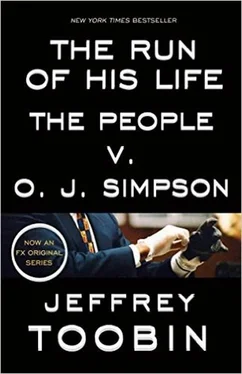Alone among the defense lawyers, Johnnie Cochran thrives. The week after the verdict, Cochran appeared as a national spokesman on civil rights on Meet the Press , and in subsequent months he traveled the nation and the world giving speeches. His legal practice is booming. He is completing a book that is more an autobiography than an account of the Simpson trial. The working title comes from a phrase he used in his summation to describe the Simpson trial: Journey to Justice .
Lance Ito conducted his next criminal trial the week after the Simpson case ended. He has never commented publicly on the verdict, but friends report that he knows the Simpson trial did not enhance his reputation. His second most noteworthy trial had a sour postscript as well. On April 4, 1996, a federal judge in Los Angeles overturned the state conviction of financier Charles Keating on the ground that Ito had erroneously instructed the jury.
After the verdict, Marcia Clark and Christopher Darden both took leaves of absence from the Los Angeles District Attorney’s Office. Neither is expected to return. Darden wrote a successful book on the trial and will shortly begin a new job as a professor at the Southwestern University School of Law in Los Angeles. He will teach courtroom skills. His brother Michael died of AIDS on November 29, 1995.
Clark’s career plans are uncertain. Since the trial, she has given a series of speeches around the United States and Canada and has worked on her own book, for which she received an advance of more than $4 million. It is believed to be the third largest advance in the history of nonfiction publishing, surpassed only by those received by Colin Powell and H. Norman Schwarzkopf. On November 12, 1995, her father left a message on Marcia’s answering machine that her ninety-five-year-old grandfather, Pinchas Kleks, had died in Israel. She did not return the call.
O.J. Simpson still lives at 360 North Rockingham in Brentwood. Every other weekend, he sees his children Sydney and Justin, who reside with Nicole’s parents, but he has not sought primary custody of them. He spends much of his time preparing for the civil suit filed against him by Nicole’s and Goldman’s heirs, a case that is expected to go to trial in the fall of 1996. His principal commercial venture since the trial, a two-hour videotaped interview with him about the murders, was a commercial failure. At $19.95 each, it sold fewer than 40,000 copies, netting Simpson about $100,000. His contracts with Hertz and NBC were not renewed. He plays golf occasionally, but never at his former home course, the Riviera Country Club. (Though he was never formally evicted from the club, members of its governing board informed Skip Taft that Simpson was no longer welcome there.) Simpson sees few of his friends from before the murders, but he does socialize with several of the sheriff’s deputies who guarded him in jail. Simpson tells them he remains confident that, in time, he will be able to resume his former career of being O.J.
My debts begin with my colleagues at The New Yorker . I owe my entire career in journalism to Tina Brown, who took a chance on me four years ago and never stopped encouraging me. I thank Pat Crow for editing my Simpson stories for the magazine, and Elizabeth Dobell for providing skillful and diligent editorial research. I benefited throughout the case from the wise counsel of Maurie Perl, Jill Bernstein, and Melissa Pranger. My thanks also to Pam McCarthy and Dorothy Wickenden. I am grateful to David Remnick for his friendship, for his sensitive reading of the manuscript, and most of all for the example of his own work as a writer. My Los Angeles colleagues, Caroline Graham and Charlotte Reynolds, made me feel like family. Over the long life of the case, it seemed that everyone involved had a lawyer. I, however, had the best: Devereux Chatillon at The New Yorker , and Bradley Phillips, Michael Doyen, and Steven Weisburd of Munger, Tolles and Olson.
This book was written during a fellowship at the Freedom Forum Media Studies Center at Columbia University. I am grateful to all my colleagues there, especially its leaders during my tenure, Everette Dennis, Nancy Hicks Maynard, and Nancy Woodhull. Matt Dallek provided terrific research assistance and welcome companionship. My gratitude also to Nancy Grimes for her help at an earlier stage. I thank the West Publishing Company for providing me with on-line access to the trial transcript.
I could not have had a more supportive publisher. At Random House, Ann Godoff steered this project (and me) with confidence, savvy, and good cheer. The copy-editing team of Beth Pearson and Veronica Windholz greatly improved the manuscript. To Elsa Burt, Enrica Gadler, Ivan Held, Carol Schneider, and the boss, Harry Evans, my thanks for their enthusiasm. My agent, Esther Newberg, was (and is) always three steps ahead of everybody.
I must have done something right in my life to deserve friends like Michael Lynton, Jamie Alter, and Eloise Lynton, who allowed me to become the second-most-notorious houseguest in Los Angeles.
Thank you, also, to Wendy Gray and the Pirate.
I have been covering the Simpson case for almost half of my daughter’s life and about two-thirds of my son’s. Ellen brought great sophistication to her analysis of the case (“I think O.J. Simpson should be in time-out for a long time!”) and Adam a healthy skepticism for the whole endeavor (“No O.J., Daddy!”). They have flourished so much despite their father’s frequent absences because of their mother, Amy McIntosh. In addition to her duties at home, my beloved McIntosh has also scaled her own professional heights during this period and still found time to edit this manuscript with care. I treasure the adventure of our life together.
New York City
July 1996
This book is based principally on my observations and interviews during the two years I covered the Simpson case. During this time, I interviewed more than two hundred people for this book. Many of them spoke to me on the condition that I not report what they said until Simpson’s criminal trial had ended. All quotations from private conversations come either from the person who made the comment or a person who heard it. All quotations from court proceedings come from the official court transcript. In Chapter 2, all of the statements by the police officers come from their grand jury, preliminary hearing, or trial testimony, but my account is also based on my interviews with the participants and the internal police reports of the investigation.
In addition to my own efforts, I have steeped myself in the voluminous media coverage of the case. I wish to acknowledge my great debt to my colleagues in the Simpson press corps. In addition to the works cited by name below, I also studied the continuing coverage of the case by a number of journalists. The Los Angeles Times served as the newspaper of record on the case, and I learned a great deal from the work of Jim Newton, Andrea Ford, Henry Weinstein, Tim Rutten, Stephanie Simon, Ralph Frammolino, and especially Bill Boyarsky in his invaluable column, “The Spin.” Also in the Times , I profited from the conscientious and thoughtful analysis of the case by (and my own conversations with) Professors Peter Arenella and Laurie Levenson. My work as a magazine writer was made more difficult by David Margolick’s brilliant and witty daily coverage of the trial in The New York Times ; my thanks to him nonetheless. I also express my appreciation to Linda Deutsch and Michael Fleeman of the Associated Press; Mark Miller and Donna Foote of Newsweek ; Elaine Lafferty and Jim Willwerth of Time ; Michelle Caruso of the New York Daily News ; Ann Bollinger of the New York Post ; Sally Ann Stewart of USA Today ; Shirley Perlman and Joe Demma of Newsday ; Lorraine Adams of The Washington Post ; and the inimitable Dominick Dunne of Vanity Fair .
Читать дальше












